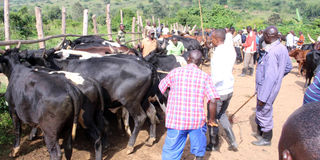Experts blame farmers over livestock diseases

Traders buy cattle at Lwemiyaga Cattle Market in Sembabule District on December 20, 2019. Dr Emanuel Kawooya, the Sembabule District veterinary officer, said livestock farmers have ignored repeated expert advice not to move animals and dairy products from areas with foot-and-mouth disease. PHOTO | WILSON KUTAMBA
What you need to know:
- The experts say local farmers have continuously failed to observe precautionary measures.
Veterinary authorities in Masaka Sub-region have blamed the recurrent outbreak of foot-and-mouth disease (FMD) in the cattle corridor on local farmers’ failure to observe precautionary measures.
FMD is an infectious and sometimes fatal viral disease that affects cloven-hoofed or divided-hoofed animals.
Most affected animals recover, but the disease leaves them incapacitated.
It can be spread by animals, people, or materials that bring the virus into physical contact with the animals.
Dr Emanuel Kawooya, the Sembabule District veterinary officer, said livestock farmers have ignored repeated expert advice not to move animals and dairy products from areas with FMD and those at high risk.
This declaration comes days after Rakai, Sembabule and Kyotera veterinarians closed all livestock markets in their jurisdiction over renewed FMD outbreak.
The closed livestock markets include Nababi and Kasanvu in Kakuuto Sub-county, Kyotera District; and Dyango, Kamuli, and Ntatamukyi in Rakai District.
Mitima, Kanoni, and Nyabitanga cattle markets in Sembabule District were also ordered to close.
“Although we vaccinated animals in some parts of the district about six months ago, one of the farmers in Nabitanga Sub-county brought in sick cattle from another area, which has left more than 50 cattle at the farm infected and the neighbouring farm has also been affected,” Mr Kawooya told Daily Monitor at the weekend.
“This recklessness has to stop because it puts the entire district at risk of being placed under quarantine for a long period of time,” he added.
Besides closing the main markets, Dr Kawooya said they have stopped the traditional practices of using livestock as prizes during different social engagements and ceremonies.
“The country is currently hit by shortage of FMD vaccines and livestock farmers must avoid movement of animals across the affected area to save them from contracting the virus,” he said.
The Rakai District veterinary officer, Dr Erias Kizito Nsubuga, said they shut the markets to enforce quarantine on the movement of livestock across the Uganda-Tanzania border, which is one of the ways to contain the disease from spreading further.
He said many livestock farmers in the district have continued to bring in cattle from as far as Mutukula and Isingiro, both at the Uganda-Tanzania border, where FMD has become endemic.
“We decided to swiftly act after noticing growing numbers of livestock affected by FMD within our district and on farms in the neighbouring districts of Kyotera and Rakai,” he said.
Dr John Mary Lutaaya, the Kyotera District veterinary officer, said enforcing compulsory isolation of animals and restricting movements will help to contain the spread of the disease.
Background
Late last year, the Ministry of Agriculture and Animal Industry rolled out a vaccination exercise against FMD in the districts within the cattle corridor, but the problem is resurfacing.
The first FMD outbreak in Uganda was recorded in 1953, according to official records. Since then, the disease outbreak recurs each year, and without a particular pattern.
The cattle quarantine in some parts of Masaka Sub-region has been in force since 2019, although it has partially been lifted in some districts, but later reinstated.
Recently, livestock experts working with Private Sector Foundation Uganda, asked the government to investigate the various strains of FMD viruses to avert further outbreaks.





